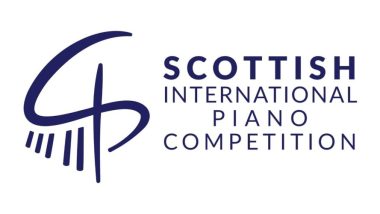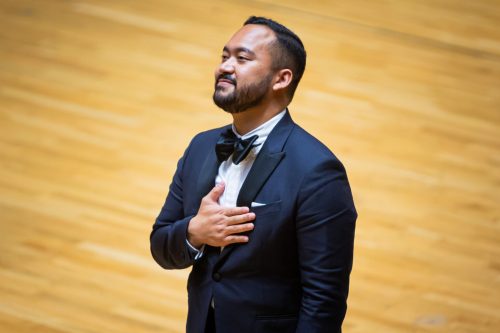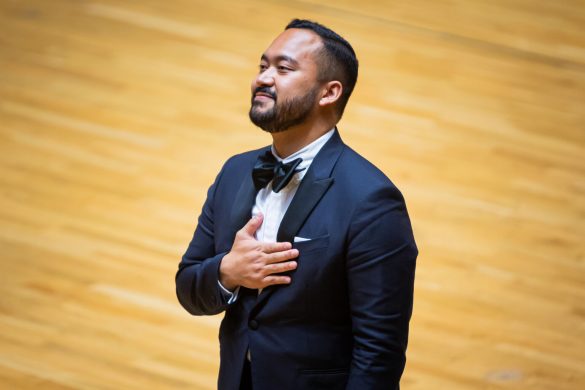
 United Kingdom Scottish International Piano Competition: Jonathan Mamora, Yonggi Woo, Yilei Hao, Royal Scottish National Orchestra / David Niemann (conductor). Glasgow Royal Concert Hall, 1 to 10.9.2023. (GT)
United Kingdom Scottish International Piano Competition: Jonathan Mamora, Yonggi Woo, Yilei Hao, Royal Scottish National Orchestra / David Niemann (conductor). Glasgow Royal Concert Hall, 1 to 10.9.2023. (GT)

Rachmaninov – Piano Concerto No.3 in D minor, Op.30
Prokofiev – Piano Concerto No.3 in C major, Op.26
Tchaikovsky – Piano Concerto No.1 in B-flat minor, Op.23
The inaugural Scottish International Piano Competition took place in Glasgow as a memorial to the Liszt pupil Frederic Lamond, who was born in the city and was among Liszt’s final group of students. Lamond made a highly regarded series of Beethoven sonata recordings and returned to his home city in 1935 where he taught until his death in 1948. He was an eminent teacher and highly regarded by many composers, including Tchaikovsky.
In the eleven competitions prior to this one, each winner is awarded the Frederic Lamond Medal and a prize of £15,000 and opportunities for concerts with the Royal Scottish National Orchestra and music promoters across Scotland. In 1986, the first winner was Graeme McNaught, and among the past prize-winners are several who have started on major international careers – Pavel Kolesnikov, Sergei Babayan, Charles Owen, Katya Apekisheva, Alexander Kobrin, and Tom Poster as soloists and teachers.
Regrettably, the event has always lacked funding from local and central government, yet the competition is blessed by enthusiastic audiences – the tickets for the concerto finals are like gold dust – so difficult are they to acquire! The first final was broadcast on TV, yet with a shortage of funding, it has depended on a loyal group of volunteers keeping it alive.
That this competition has survived several recessions and a worldwide pandemic is remarkable – hence, after six years of absence – this year’s event was eagerly awaited – not only to hear a feast of piano music but to sense the feeling that things in the arts are returning to normal. Of course, one of the constant arguments in any music competition are the judgements over which musicians advance to the next round and ultimately, the concerto final.
Most certainly, of the pianists I heard, it was surprising that several names were not in the semifinal stage of ten competitors. If I were a gambler, I would have put my house on one or two musicians to be in the final, but they didn’t even get to those semifinals.
Of the thirty pianists selected for the competition, one could have guessed that the winner would come from the Far East, but not even any of the six Russians got to the semifinal – an astonishing result – considering the reputation of the Russian piano school!
The panel of judges who oversaw all stages of the competition was chaired by the competition’s Artistic Director, Professor Aaron Shorr (non-voting) and the jury also included renowned concert pianists Ingo Dannhorn, Clare Hammond, Carole Presland, Marc Silverman, Boris Slutsky and Albert Tiu. I am often told that jurors don’t actually base their decisions on who is the best or most gifted pianist technically or artistically but who can be the one who makes the least mistakes through the course of the event so they can offer a pianist – an all-round musician – to the music world … in other words a new name.
The jury’s decision to pick three competitors from the Far East was therefore no surprise and all the finalists had a mixture of experience and talent. Of those who did not make it to the final – but played exceptionally in repertoire – familiar and less familiar, Korea’s Jeongjin Kim was outstanding with her performance of the Prokofiev’s Seventh Sonata, in which she displayed magnificent skills and artistry. She superbly completed her programme in a varied programme of Rameau, Debussy and Chopin. She played as well in the semifinal, especially with a gorgeous performance of the Rachmaninov Variations on a Theme by Corelli and must have been very close to getting into the final. One other pianist who did not progress was the Chinese Xuehong Chen, who played Bartók’s Sonata Sz.80, in a thrilling interpretation displaying magical technique and artistry. The other pieces in his programme were three Scarlatti sonatas, a Chopin Etude and the ‘Fanfares’ Etude by Ligeti.
The Ligeti etude was also memorable in Yifan Wu’s second-round performance, and especially notable was his remarkable and very moving interpretation of the Beethoven Sonata, Op.27, No.1. The Chinese musician only made it as far as the semifinals but I am sure that we will hear more from him in the future. One finalist who made an early impression was Yonggi Woo from Korea, whose Symphonic Etudes by Robert Schumann was outstanding bringing out all the romanticism and colour from the score – showing he was a genuine candidate for the top prize. A Chinese musician who got to the semifinals, but looked set to make the final was Jialin Yao who devoted his second-round programme to just one piece – Schubert’s Sonata in C minor D.958. His playing was beautifully articulate and combined with intensely powerful expression and throughout with innate sensitivity. He is sure to have a great career in the years ahead.
In his 150th anniversary year, Rachmaninov’s compositions were frequently heard in competitor’s programmes. Unfortunately, the Russian Dmitrii Kalashnikov made errors in his Rachmaninov Second Sonata despite playing well in his other pieces. It was strange that none of the six Russian competitors managed to progress beyond the second round; most certainly, Maxim Kinasov’s performance of the Liszt Dante Sonata was astonishing in its technique and, most of all, the artistry. It was a major highlight of the second round and I have never heard it played so magnificently. Kinasov held the listeners in his hands – it was such a captivating performance – yet somehow he missed out. He also played poetically Bauer’s arrangement of Franck’s Prelude, Fugue et Variation, and he played with great expression the Rachmaninov Etude-Tableaux in C-sharp minor. He seemed a certainty to advance to the final, but alas, not in the opinion of the jury.
One regrettable absence from this year’s competition was any pianists from the UK, even more so considering the very first winner was Glasgow’s Graeme McNaught in 1986. There have been several excellent British performers in past years, but the current lack of Brits here is a consequence of the decline in musical tuition in schools in recent decades and funding for the arts in general. It is even more evident in the many gifted musicians from the Far East – from countries where more funding has been invested in the arts, notably here from China, Korea and Indonesia.
The concerto final was warmly anticipated by all who attended the first three rounds (held in the Stevenson Hall of the Royal Conservatoire of Scotland), and the final was sold out at the New Auditorium in the Glasgow Royal Concert Hall which has wonderfully clear acoustics. Every final competition has featured an obligatory contemporary work, on this occasion by David A T Ōnaç, and it was any two etudes from his set of five etudes which were premiered by Peter Donohue in 2007 in Brussels. Amazingly, on the day before the concerto final, the composer rewrote his set of etudes to correct mistakes which some of the contestants had pointed out to him during the semifinals!

In Jonathan Mamora’s performances from the very first round, there already seemed to be a strong candidate for the top prize with his several piano competition victories in the United States and his growing career in the Far East. I thought his performances in the first rounds very impressive both in his keyboard technique and his artistry. Whether it was music from the baroque period to modernism, Mamora’s artistry was outstanding without any weaknesses, and most of all great musical expression.
His choice of the Rachmaninov Third Concerto was impressive although his handling of the big cadenza was a little underwhelming with some slips in his keyboard playing; although he played magnificently the rarely played ossia cadenza afterwards and provided a very secure interpretation of this magnificent concerto. Unfortunately there was an imbalance in sound between Mamora and the orchestra which sometimes seemed to drown out some of his playing. In the second slow movement, his playing was deeply intimate and touched many in the audience with his spellbinding virtuosity. Throughout, there was wonderful accompaniment by the woodwind group and the strings ably directed by the young German conductor David Neimann.
The second finalist, from South Korea, Yonggi Woo, was excellent in his keyboard playing, and again was superbly accompanied by the RSNO in Prokofiev’s difficult, yet ever popular Third Piano Concerto with magnificent flute playing from Katherine Bryan in the slow movement. There were some false notes, but there was a better balance between orchestra and the soloist, and it was an exciting performance, yet he seemed not to be on the same level as Mamora. Woo sits low over the keyboard using a smaller stool than the other competitors and his almost crouched figure was especially intense throughout the performance. I liked his playing very much and he often looked up at the heavens searching for empathy with the emotionality of the music.
The Chinese pianist Yilei Hao playing of the great Tchaikovsky concerto was technically very accomplished and throughout he was superbly accompanied by the orchestra with outstanding solos from the woodwind and brass. For me, Hao lacked the identification with the music’s sensitivity and deep romanticism in a sparkling performance without the depth of emotional feeling required. Certainly, the grandeur of the work produced an exciting finale.
Of the awards, the jurors could not split Yonggi Woo and Yilei Hao and both shared second place, while the winner’s title was justifiably awarded to the American-Indonesian Jonathan Mamora, who also received the prize for best performance of the contemporary piece. In all, this was a memorable competition, most importantly thanks to the wonderful young pianists performing here. It remains an important festival of piano music showcasing some of the world’s finest young talents and hopefully stars of the future.
Gregor Tassie
